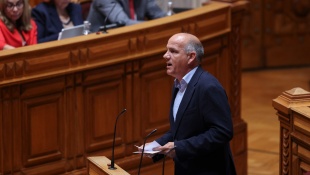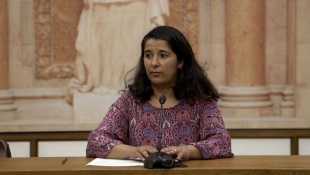Following the discussion and vote on the 2026 State Budget, that revealed the consequences of the political choices contained therein, which will lead to greater inequality and injustice, with the benefits granted to big capital through IRC corporate income tax cuts, tax benefits, public-private partnerships and large transfers of public resources, which contrast with a policy of low wages and pensions and attacks on public services and on the social functions of the State. At the same time, in this budgetary exercise, it became clear that the Government, instead of working to solve the problems of the people and the Country, is only interested in achieving a budget surplus at the expense of public investment, jeopardising the future and leading to future deficits in terms of the budget, production and even demographics.
These are political choices that the PCP has denounced and fought against, and as it stated from the outset in the discussion of the State Budget, that it would also present proposals for a different course for the country.
Once the specialised discussion phase begins, the PCP will intervene with proposals that prove that it is possible and feasible to implement a policy that focuses on responding to the problems experienced every day by workers, pensioners and youth. Today, we submitted the first 10 proposals that put forward concrete solutions to increase wages, pensions and incomes, to tackle the high cost of living, to strengthen public services and to implement the rights enshrined in the Constitution.
The improvement of the workers' living conditions and boosting economic activity requires an effective increase in wages and pensions. We propose, while advocating wage increases for all workers, also increasing the purchasing power of Public Administration workers, including those in the public enterprise sector and the local business sector, taking into account the accumulated losses in purchasing power of more than 20% since 2010. This proposal which, within the framework of collective bargaining with workers' representative organisations, is based on an increase of no less than 15%, with a minimum of 150 euros, as well as an increase in the national minimum wage to 1050 euros in 2026. This morning, we submitted a Draft Resolution to increase the national minimum wage to €1,050. We also propose updating the meal allowance to €12, given the increase in food prices.
The pension update planned by the Government – in the order of 2.7% up to 3 IAS (Social Support Index) – falls short of what is needed to boost the purchasing power of retirees and pensioners, when around one million elderly people in the country receive a pension of up to €510. The PCP therefore proposes a 5% increase in pensions, safeguarding a minimum increase of €75 per pensioner, thus ensuring that the lowest pensions receive a proportionally higher increase.
The energy sources used by the overwhelming majority of households in the country is cylindered gas, the price of which is unaffordable for many, reaching up to €38. In Spain, the price of the same gas cylinder is around €16/17, well below the price in Portugal. In this regard, we propose regulating and setting the price of cylindered gas at €20, reducing the profit margin of large companies in the sector.
On another level, the attack on constitutional rights is very obvious in healthcare, education and housing.
Despite government propaganda, difficulties persist in obtaining medicines. Many users continue to have to choose the medicines they can afford, even though they know this compromises their health. We propose the free dispensing of medicines in healthcare centres and community pharmacies to users over 65 years of age, to the chronically ill and to those in financial need.
Meanwhile, the main problem facing the NHS is the shortage of professionals resulting from the devaluation of careers, low wages and the assault by private economic groups, diverting workers from the NHS to the private sector. Increasing the number of healthcare professionals in the NHS requires improving their rights and working conditions, careers and wages. To this end, the PCP proposes the implementation of a full-time employment regime, with a 50% increase in basic pay and better career progression, creating the conditions for retaining healthcare professionals, ensuring the allocation of family doctors and nurses, the functioning of services and the timely provision of medical appointments and surgeries.
In education, the problem of students without classes due to a lack of teachers stands out. Its resolution requires the valorisation of the teaching profession, which the Government has been postponing. We therefore propose the valorisation of the teaching profession through collective bargaining with trade unions, ensuring that this is implemented in the next school year.
There is a shortage of places in nurseries. Every year, parents and families struggle to find a place for their child. To respond to this need, the PCP proposes the creation of a public network of nurseries, with the aim of achieving nationwide coverage by 2031.
To remove obstacles to access to higher education, the PCP proposes the elimination of tuition fees for bachelor's degrees, integrated master's degrees, master's degrees, doctorates, postgraduate degrees and higher professional technical courses, as well as the elimination of fees and charges within two years, attributing due compensation to higher education institutions.
The crisis in access to housing is a reality in our Country. Housing prices continue to rise sharply, rents are reaching unbearable levels, families are being evicted from their homes, and young people and families cannot find housing they can afford. Solving this problem requires a comprehensive response, which include concrete measures to protect rented housing, namely guaranteeing the stability of tenancies by extending contracts to 10 years, limiting evictions and capping rents in new contracts, thereby ensuring not only regulation but also a reduction in prices. We have to put a stop to the liberal logic in housing, with its well-known impacts, and that is what the PCP is proposing.
These are the PCP's first 10 proposals for the 2026 State Budget. Over the next few days, we will be submitting proposals in various areas, as well as proposals that will provide material and financial support for many of the measures we intend to put forward, which not only show that it is possible to solve concrete problems but also point to an alternative course for the Country.



